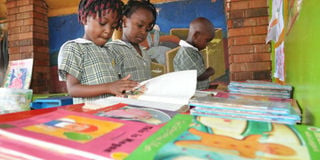Help children learn their mother tongue

Children should be encouraged to learn as many languages as they can from a young age. Photo by Rachel Mabala
Every year since 2000, the world joins together to commemorate International Mother Language Day. The day serves to promote linguistic and cultural diversity and multilingualism. According to the United Nations, at least 43 per cent of the estimated 6,000 languages spoken in the world are threatened and only a few 100 languages have genuinely been given a place in education systems.
Sydney Angella Mirembe, 15, is among the people currently suffering loss of their mother language. Born to a Ugandan father and a Nigerian mother in Sydney, Australia, Mirembe grew up in a multilingual family.
“My father does not know my mother’s language, neither does my mother know Luganda, but growing up, they both tried to teach me their languages which never worked. The dominant language at home and outside was English, and that is what I learnt. I know only a few Luganda words and a few in Igbo. Sometimes it is troubling especially when people ask you which language you speak other than English,” Mirembe says. She, however, believes that now that her family is staying in Uganda, she will be able to learn luganda.
The education role
Research shows that children’s first language is the optimal language for literacy and learning throughout primary school, according to UNESCO.
“Inspite of growing evidence and parent demand, many educational systems around the world insist on exclusive use of one or sometimes several priviledged languages. This means excluding other languages and consequently the children that speak them,” the article partly reads.
But it is not shameful at all to speak one’s mother language.
Learning against all odds
Jan Mukiibi, the current Miss Uganda UK, is a Ugandan born and raised in UK, who has learnt her mother language against all odds.
“Growing up, our house was a no-English zone. My parents would always tell me that English stops at the doorway. Learning Luganda was compulsory and looking back I am very grateful that my parents put me through it,” she reminisces. To date Mukiibi listens to Ugandan music on YouTube and watches movies in Luganda as they are some of the esthetic ways of learning a language.
And music is something Diana Lwanga alias Mukwano Gw’abato uses too to teach Luganda to children and adults in the UK. “I grew up in Uganda but I have lived in Europe for more than 13 years. I introduce Luganda, through music and have recorded 25 nursery songs on an album called Luganda nursery rhymes,” she explains.
She derives her passion for teaching the language from her childhood experiences. “I was raised by a Muganda mother. And as much as I could speak English from a young age, we spoke Luganda at home.” “I am now focusing on making as many animated videos of the songs as I can for children to enjoy and learn Luganda in the home,” she says.
Why mother language?
Daniel Zuchwoski, a Linguist, notes that being drawn to people who speak the same language is a natural thing. “As babies, we can immediately recognise our mother tongue and differentiate it from other languages. This was demonstrated by a study on 30-hour-old infants conducted at the University of Washington a few years ago,” he says.
Lwanga also believes that knowing one’s mother tongue gives them an identity, a sense of belonging. “I never have to feel less than I am because of living in a foreign land since I know where I come from and I am proud of my roots. That kind of confidence is what I want my children to have growing up in the Diaspora, because they are still African, Ugandan and Baganda,” she is convinced.
Tips for parents
“Do not be afraid to teach your children their mother language because they will no doubt learn English in school,” Lwanga says adding that schools should also stop shaming and punishing students for speaking their local dialects since being able to communicate in your mother language facilitates better learning.
Make your mother tongue the love language in the home. “Use words such as nkwagala nyo, (I love you so much) Oli Mwana mulungi (you are a good child), ye nga olabise bulungi (you are looking good), kale onsanyusiza (you have made me happy), nkwenyumiririzaamu (I am proud of you) for praise and endearment,” she says.
Also avoid using your mother tongue only for rebuking your children as well as insulting them. That way they will associate it with love than hate, Lwanga adds.
Crucial facts
In 2007, Uganda introduced the Thematic Curriculum that aimed; at the use of familiar area language as a medium of instruction for pupils by the teacher. This may be a Local Language for the learners whose first language is not English, English or any language that the learners are able to understand. Use of non-text book materials and continuous assessment of learners’ achievements as some of its major pillars.
This is used for Primary one to three with its content arranged around themes that are familiar to the learners.
– Source: NCDC




